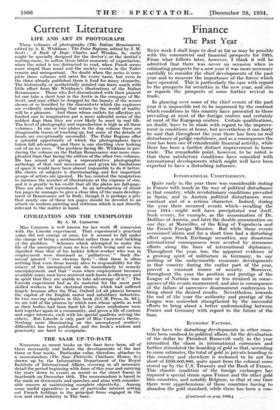Miss Cameron is well known for her work ill connexion
with the Lincoln experiment. That experiment's practical value did not emerge at once, for it seemed to fall under the charge of being a sentimental rather than a real tackling of the problem. Schemes which attempted to make the life of the unemployed man no less worth living and no less dignified than that of his luckier fellow-worker who was in employment were dismissed as palliatives.' " Such dis- missal ignored " two obvious facts "—that there is often nothing that even those keenly alive to responsibility for the misery of the unemployed can do immediately to remedy unemployment. and that " even when employment becomes available many men have received such harm in efficiency and in spirit that they are unable to take advantage of it." The Lincoln experiment had as its material for the most part skilled workers in the electrical trades, which had suffered largely because after the War, Oxford (of all places) became the capital of the English motor and subsidiary industries. In two moving chapters in this book (S.C.M. Press, 3s. 6d.), we are told of the process by which men whosespirits as well as their bodies had been hard hit by sheer misfortune were knit together again in a community, and given a life of various and eager interests, each with his special qualities serving the others. But Lincoln is only part of Miss Cameron's theme. Nothing more illuminating on the unemployed worker's difficulties has been published, and the book's wisdom and generosity are hard to overpraise.


































 Previous page
Previous page